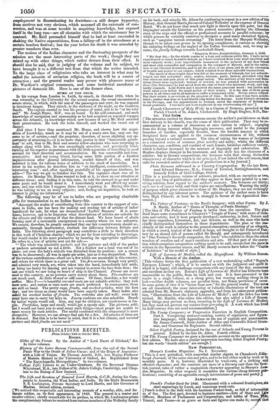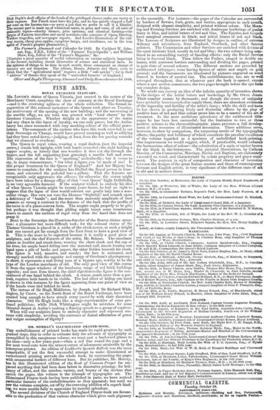PUBLICATIONS RECEIVED.
From October 24th to October 30th. BOOKS.
Githa of the Forest. By the Author of " Lord Deere of Gilsland," &c. In three volumes.
History of the Later Roman Commonwealth, from the end of the Second Punic War to the Death of Julius Custer; and of the Reign of Augustus: with a Life of Trajan. By Thomas Arnold, Di)., late Regius Professor of Modern History in the University of Oxford, &e. Republished from "The Encyclopedia Metropolitans." In two volumes. College Life; Letters to an Under-Graduate. By the Reverend Thomas Whytehead, M.A., late Fellow of St. John's College, Cambridge, and Chap- lain to the Bishop of New Zealand.
The I.* and Services o f General Lord Harris, G.C.B., during his Cam- paigns in America, the 'West Indies, and India. By the Right Honourable S. R. Lushington, Private Secretary to Lord Harris, and late Governor of Madras. Second edition, revised. [We noticed this respectable and interesting memoir of a worthy, able, and for- tunate soldier, on its first appearance, in 1840. The present is a neater and smaller edition; chiefly remarkable for its preface, in which Mr. Lushington prints the complimentary letters he received from various members of the Wellesley family on his book, and attacks Mr. Alison for continuing to repeat in a new edition of his History, that General HarrisfavouredColonel Wellesley at the expense of General Baird. We do not know that much new light is thrown upon this point, but the biographer assails the historian on his general narrative; placing the Alisonian story of the siege and the official or professional accounts in parallel columns; by which process he certainly contrives to dissipate a good many rhetorical figures, such as " sanguine torrent streaming." The letter from the Marquis Wellesley, though to be taken cum grano in its opening compliment, is curious as showing his enduring feelings on the neglect of the Indian Government, and, we may as- sume, the family feelings towards Leadenhall Street.
"Kingston House, Knightsbridge, January 4, 1840. " My dear Sir,—In the whole course of a long and arduous public life, I have never experienced so much heartfelt delight as I have received from your most excellent and most valuabl work ; your imperishable monument to the memory of my dear friend and most able counsellor and companion in the conquest of Mysore, and in the salvo,. Hon of our Oriental dominions, and in all the glory of our arms, and in all the extension of wealth and power to our empire, which resulted from those splendid transactions. " The merit of those bright days was felt at the moment of triumph, but not acknow- ledged, nor duly rewarded : envy, malice, intrigue, party, faction, prevailed over the true Interests and pore glory of this great nation. The services of my brave and Mal- trious friend were neglected : instead of reward, he was greeted with persecution by those [the Directors] he had saved from the rain of their own ignorant, weak, and das- tardly counsels. Lord Powis and I received the same graceless mesa : but justice and truth ruled even before the usual period of their return. It is the fate of those great powers in all times and in all nations to suffer a temporary exile. Terms Astrea But their return is 119 certain as the progress of time. In this case it has been accele- rated ; justice was done to Lord Harris long before hts decease. Lord Powis's elevation in the Peerage, and his appointment to Ireland, saved the character of British na- tional gratitude. I too have not been neglected in my overweening old age.")
Female Characters of Holy Wri t; in a Course of Sermons, preached at the Parish Church of St. John's, Clerkenwell. By Hugh Hughes, B.D., Rec- tor. First Series.
[The attention excited by these sermons among the author's parishioners on their first delivery in his church, was the cause of their publication. They may be re- commended as a volume of discourses at once various in subject , engaging from the living interest which biography possesses, and useful to the younger branches of families, especially females, from the forcible manner in which Scriptural facts arc applied to the common circumstances of life, without passing beyond a rational measure. The idea of taking the women of Scripture
as a connected series of sermons gives novelty and unity; whilst the different character, age, condition, and conduct of each female, furnishes sufficient variety, which is farther increased by the mixture of biography and exhortation. Mr. Hughes displays thought in his treatment, and his style has the clearness of a scholar; but as literary compositions, the Sermons want that strong distinctive idiosyncracy of character which is the principal, if not indeed the sole reason, that calls for extended notice of this class of productions in a lay journal.] Plain Sermons addressed to a Country Congregation. By the late Reve- rend Edward Blencowe, M.A., Curate of Teversal, Nottinghamshire, and formerly Fellow of Oriel College, Oxford.
[This is a posthumous volume of sermons, preached, with an exception or two, without any idea of publication; and they appear to have been printed by a sur- viving relation, from regard to the author's memory. The Sermons are thirty; each one is of course brief, and their topics are mi.seellanious. Wanting the !natty of purpose which gives character to those of Mr. Hughes, they are not strikingly distinguished by any inherent power. The opinions of the author seem to have been High Church; at least he is strongly in favour of the Apostolical Sae- cession.]
The Palace of Fantasy; or the Bard's Imagery; with other Poems. By I. S. Hardy, Author of "Hours of Thought, or Poetic Musings." [The idea of The Palace of Fantasy is better than the execution. The plan' itself bears some resemblance to Chaucer's "Temple of Fame," with more of rich- ness and variety, had it been properly developed; embracing, in fact, Nature and. her three expositors, Literature, Art, and Science as well as the men who haver chiefly distinguished themselves in those departments. The plan or the ma- chine7 of the work is inferior to the general conception; consisting of an allegory, in which a crowd, typical of the world at large are brought to the Palace of an- tasy by an absurd sort of person called Sir Herald, and subsequently introduced " Dan Fantasy's favourite companion, the bard," who exhibits to them the select wonders of creation and of man's exertions and arts. Of that part of the execu- tion which comprises composition nothing needs to be said, except that the piece is written in the Spenserian stanza, and Mi. Hardy seems to have taken the 'iCastle of Indolence" as his model of style.] Life of Lorenzo de' Medici called the Magnificent. By William Roscoe. Witha Memoir of the Author.
[This volume forms the first publication of a new undertaking called "Begets European Library"; which, if it be carried on with the judgment and spirit in which it is begun, will challenge comparison with any issue of the day, numerous and excellent as they are. Roscoe's Life of Lorenzo de' Medici has hitherto been inaccessible to the public, from its bulk and cost. It is here presented to the reader in a single volume, at a cheap price, but wearing nothing cheap in its look—neither double columns, nor pec li form, nor flimsy prettiness of cover. In some points of view it is "better than new," for the general reader. The notee are all translated; the more interesting or valuable illustrations of the text are selected from Mr. Roscoe's elaborate appendix, and from his subsequent publica- tion, "Illustrations from the Life of Lorenzo de' Medici"; and the index has been revised. Mr. Hazlitt, who edites this edition, has also added. a Life of Roscoe. Many things may prevent us from recurring to the Life of Lorenzo de' Medici; but they need not prevent our readers from procuring it. A work which has lived its half-century does not need recommendation.]
The Young Composer; or Progressive Exercises in English Composition.
Part I. Comprising sentence-making, variety of expression, and figura- tire language; with Appendixes on the use of capitals and punctuation. By James Cornwell, Joint-Author of Allen and Cornwell's School Gram- mar, and Grammar for Beginners. Second edition. Select English Poetry, designed for the use of Schools and Young Persons in general. Edited by the late Dr. Allen. Fourth edition. [Of The Young Composer we gave a favourable account on the appearance of the brat edition. We have also a similar impression touching Select English Poetry; but the words "fourth edition" are enough.1
NEW PERIODICAL.
Sharpe's London Magazine. No I. November.
[This is a new periodical, with somewhat similar objects to Chambers's Edin- burgh Journal; of the same size and price, and to be had either week by week or in monthly parts. It is however, illustrated by wood-cuts, of a striking and effective character; and the contents are more of a literary cast than the Scot- tish journal,. tales of rather a magazinish character appearing in Sharpe's Lon- don .Magazzne. In other respects it resembles the various cheap literary pub- lications; consisting of an agreeable enough intermixture of prose and poetry.]
ALBIANACKS.
Punch's Pocket-Book for 1816. Illustrated with a coloured frontispiece, six steel engravings by Leech, and numerous wood-cuts.
[Punch is first ni the field with his facetious Pocket-book,. as full of information as of fun. The first part, devoted to business matters—lists of State and LAI Officers, Members of Parliament and Corporations and tables of Time, Tide, Transit, and Taxes—is as grave as facts and figures can make it; except that Dick Doyle's droll effigies of the headset the privileged classes make one merry at their expense. But Punch must have his joke, and be has quietly clapped a half per cent on the Income-tax—so sorry a jest that we prefer to call it a blunder. The second part is made up of whimsical satire, in prose and verse, of all sorts of guizzable topics—charity dinners, prize cartoons, and chemical farming—the uagon of Eastern travellers and naval novelists—the nonsense of Opera librettos, yardree tragedies, and newspaper reports. And Leech's illustrations of the rail- way mania, cheap pine-apples, camphine lamps, and omnibuses, are in the true spirit of Punch's graphic pleasantries.]
The Farmer's Almanack and Calendar for 1846. By Cuthbert W. John- son, Esq., F.R.S., Editor of the "Farmers' Encyclopedia"; and William Shaw, Esq., Editor of the "Farmer's Magazine," &c. [Contains a great quantity of useful information on various subjects important to the farmer, including recent discoveries of science and statistical facts. In the epitome of things to be done in each month, those consequent on change of tenancy are not forgotten. The editors, Messrs. Johnson and Shaw, seem to think that the "agricultural mind" requires a little "soft sawder"; for in their "address" of thanks they speak of the "unrivalled farmers" of England.] Oliver and Boyd's Threepenny Almanacic and Daily Remembrance?. for 1846.



























 Previous page
Previous page